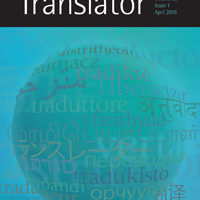Translating resistance in art activism
Hip Hop and 100 Thousand Poets for Change DOI: 10.1080/14781700.2016.1190944 Stefania Taviano, Translation Studies, Volume 9, Issue 2, pages 282-297 Published online: 07 Jun 2016 ABSTRACT This article examines the role of translational and polylingual practices in global forms of art activism. It is through translation, both narrowly and broadly speaking, that local issues with a universal resonance overcome cultural and
» Read more
